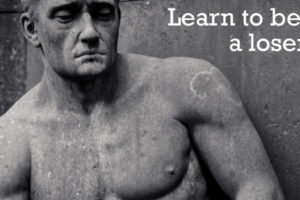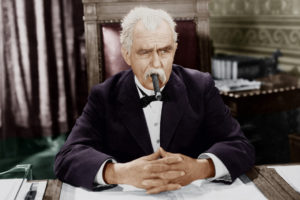How great leaders ensure our survival
The two mice were starving, so they crept into the farmer’s house in search for food. The trouble was that the whole place was rigged with mousetraps.
They explained their dilemma to the chicken. “Sorry, I can’t help you” the chicken clucked nervously. “I’m trying to lay an egg”.
The mice moved on and went to see the pig.
“Sorry, I can’t help” the pig snorted greedily, “I also have to eat you know”.
Now desperately hungry, the mice went to see the cow standing in the field.
“Sorry, I can’t help you” she said lazily. “I need to produce more milk for the farmer and I’m too tired to do anything else”.
The following day, the farmer’s wife accidently stepped on a mousetrap. The wound got infected and she became ill. So the farmer killed the chicken and made his wife a lovely nourishing broth.
Everyone in town came to visit his sick wife, but he had nothing to offer. So he killed the pig who was now nice and fat, and cooked him over an open fire.
When farmer’s wife got better, he threw a party and slaughtered the cow who no longer produced milk. Everyone ate well that day, including the mice.

This story was told by a priest, deep in rural Brazil. His congregation mainly consisted of subsistence farmers. Brazil at the time was in the middle of a leadership crisis due to the Petrobras scandal – President Dilma Rousseff was about to be impeached.
He wanted to explain the importance of self-sacrifice and in doing so, briefly pointed to the crucifix on the wall of the church above his head. His point was that serving and protecting others creates the foundation for strong leadership.
Many in the congregation felt betrayed by those they elected into government who appeared to be lining their pockets. Ironically, some of these politicians even proclaimed that their work was for the common good, and not for the power, the money and the glory that they desired.

Of course, weakness in leadership has been observed around the world and throughout history. It’s the examples of great leaders that existed in the past that are interesting. There are so many of them: Mahatma Gandhi, Abraham Lincoln, Winston Churchill, Nelson Mandela to name a few.
Though some of these individuals were not always perfect, their willingness to serve and put themselves out into harm’s way, inspired millions. They were not afraid to face the unknown. They would rush towards it, either our safety or to help pull us into a better future. They would sacrifice what’s their for ours, including their own liberty at times.

It is better to lead from behind and put others in front, especially when you celebrate victory when nice things occur. You take the front line when there is danger. Then people will appreciate your leadership. (Nelson Mandela, 1918-2013)
By serving and protecting others, a leader actually increases the chances of its group’s survival and success. It’s not just about being moral and good. Nor is it a weakness that others will exploit – if they do, they should be asked to leave the group.
One of the easiest places to distinguish between those that bear the qualities of leadership and those that don’t, is in the workplace. Former US President Theodore Roosevelt once made the distinction: “People ask the difference between a leader and a boss. The leader leads and the boss drives”.

Employees are easily able to determine whether their CEO is a real leader, or just a fat cat boss. But investors don’t always have access to this inside view.
It’s these CEOs that can really lead that investors want at the helm of the companies they invest in. But it’s also very difficult to assess the true “quality” of leadership from the comfort of an armchair.
In a former job, I used to arrive at work at 7:00 am. The investment team I worked with had a daily meeting, where the analysts would pour over metrics religiously, discussing at length quarterly earnings when the season started, the guidance given and the outlooks offered by senior management. When they weren’t pouring over these, I would hear about sales projections, the quality of the product or service provided, compliance audits, disruptive industry developments etc.
It was all very interesting and during this period of time learnt to appreciate the value of good quality financial statement analysis. I learnt about the difference in accounting methods like GAAP and FASB and how these could be used to compare traditional measures of earnings, cash flow and profitability.

But, there was also another lesson that I learnt from the portfolio manager who was mentoring me at the time. He explained that you need to look beyond the metrics.
Recent studies have shown that these only explain about 50% of a company’s market value. He would therefore constantly pick up the phone and talk to people – the most unusual people. He did this because leadership is very difficult to measure in a quantifiable way. It’s actually often better understood by people who are not professional investors he explained, such as those who work for the company or the industry those companies operate in.
He spoke to suppliers, customers, competitors, former employees, litigators, bankers, union leaders, journalists and even a private investigator. This allowed him to gain a deeper understanding of a company’s business strategy, brand value and ability to innovate. The strongest explainer of these factors that gave a company the edge was in his opinion, leadership.

Everybody appreciates that good leadership is important. When it exists, it can be felt throughout an organisation and corporate culture is developed rather than forced. Employees clearly understand the visions and the goals of the company. They believe that their role is important and as a result morale is high, staff turnover is low and often the business does very well.
These are the types of well-run companies that often prove to be great investments.
Perhaps such leadership qualities would be too much to ask for in the chicken, the pig and the cow in the story – they are farm animals after all.
But there are some who would prefer to live one day as a lion, than an entire lifetime as a sheep. I take my hat off to them. It’s these great leaders that will ensure our survival.
I’m not afraid of an army of lions led by a sheep. I’m afraid of an army of sheep led by a lion (Alexander the Great)
Unknown










